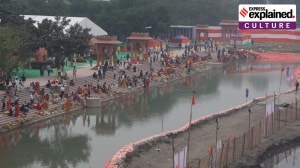Valentine’s Day: When love was the greatest freedom for Punjabi poet Amrita Pritam and artist Imroz
The letters between Amrita Pritam and her partner Imroz not only offer a glimpse into their mutual affection for each other but are also document the social history of the times
 Amrita Pritam and Imroz were together for more than four decades. (Credit: Express Archive)
Amrita Pritam and Imroz were together for more than four decades. (Credit: Express Archive)‘Bombay says welcome to her artist’
IT WAS a one-line letter that began the story of a lifetime. Penned by Amrita Pritam, one of Punjabi literature’s most significant poets, this undated, unaddressed and unsigned letter to her beloved and artist Imroz, who moved to Mumbai to work with Guru Dutt, she becomes Bombay, the city, welcoming him in her familiar arms.
While Amrita and Imroz wrote many letters to each other, it’s notable how a lot of her writing, unabashed and fearless, was also in the form of letters. Her magnum opus Sunehade (Messages) which won her the Sahitya Akademi Award in 1956, making her the only woman writer to win the award for writing in Punjabi, is a long poem that is a letter for poet Sahir Ludhianvi. Amrita fell in love with him after a mushaira in Preet Nagar near Amritsar, where both were invited. At the time Amrita was married to publisher and editor Pritam Singh and lived in Lahore. Sunehade begins in 1953, after a letter from Ludhianvi. Aakhri Khat (Last Letter, 1956), too, was for him. It was quite extraordinary to make the present and the intimate of one’s life part of one’s literary endeavours, and while doing so, put out messages that could transcend geographical boundaries. These letters always made it. They weren’t suspended in transit or weren’t at the mercy of the Indian Postal Department.
*****
Amrita and Imroz met in 1958 and remained together for 45 years, till Amrita’s death in 2005. Imroz had many names for Amrita — Barkate, Aashi among others. When he read the novel Zorba the Greek by Nikos Kazantzakis, he began calling her Zorbi. Maaja came from The Naked Maja, a novel on Spanish artist Francisco de Goya. She’d often call him Jeeti and Ima.
Yesterday, Pt Jawaharlal Nehru invited Khrushchev (Nikita) for lunch. I went there.
I really like Pandit ji, he epitomises all that is beautiful in humanity.
I was happy for a while but all of a sudden the fact of being away from you seized me intensely and everything became meaningless – the day, the routine, the socialising, everything.
13.2.60
Aashi
Here, Amrita casually mentions a lunch between then PM Jawaharlal Nehru and Soviet Premier Nikita Khrushchev, which was after the talks on the Sino-Indian border issue, hoping that Khrushchev, whose country was making many scientific and economic advances, would understand and offer help to resolve the matter. It’s also a glimpse into Pritam’s fondness for Nehru followed by a sudden yearning to be with the man she loves.
*****
At night, I dreamt that you were making gobhi parathas in the kitchen.
Salli and I are sitting to your left and right and eating.
You were feeding us, happy.
In the morning, in my room, I kept thinking.
I couldn’t eat anything.
Had eaten enough from your hands at night, no…
18.11.60
This simply written, unsigned letter from Imroz for Amrita, blurs the boundaries between fact and fiction gently. There is a certain affection and intimacy in the lines, of being isolated and dreaming about one’s love and then writing about it all in the morning.
Gulzar had come yesterday. ‘I heard that you aren’t well, so came to check on you. What happened?’
I told him, ‘I am more or less fine but the moment the sun goes down, the pain begins.’
Gulzar started laughing, ‘In the older times, someone had tied Kaal to a peg, why don’t you tie the sun to a peg. Don’t let it drown.
I told him, ‘I have already tied it. When Jeeti’s letter comes in the evening, that’s the sun only’…
Am I any less of a magician? I can also tie the sun to a peg
In every breath I wait for you.
3.1.69
Zorbi
While the first letter, has Imroz compare Amrita to her sun two years later, she does the same when she describes a conversation with poet and filmmaker Gulzar, which is not only a peek into the wonderful relationship the two poets shared, but also of a very poetic conversation, the metaphors finding different meanings for both. Even in pain she finds solace with the idea that Imroz’s letters are the sun of her life.
***
I am lying alone here, like a blind child’s mother has left him at the masjid.
The trains should break into pieces that don’t bring you back home.
Anger filled
Zorbi
When will you fill your eyes and look at me and when will light look at me?
The morning of 21.11.60
My Zorbi…
Since last night, I have been fueled by Khalil Gibran…
While talking about himself, he talks about everyone, with such simplicity.
Love is the only freedom in this world
Imroz
An exasperated Amrita writes to Imroz, asking him to return to Delhi soon, her impatience clear in the tone where she wants the entire railways to crash and burn for not bringing Imroz home.
While the reply to this letter isn’t documented, Imroz’s dignified affection and love for Amrita and goading her to be with him in the following letter, comparing her to the light of his life, is a peek into the affection and complexity of their relationship. Amrita was already married to someone else and in love with another for years. That she should choose the idea of being loved as well, is what Imroz requests in many letters including the last one. Amrita did. She chose Imroz.



- 01
- 02
- 03
- 04
- 05




























